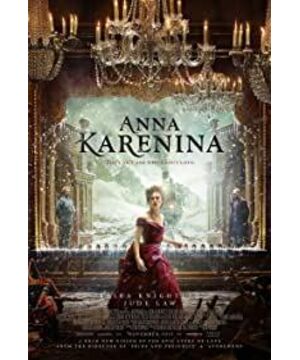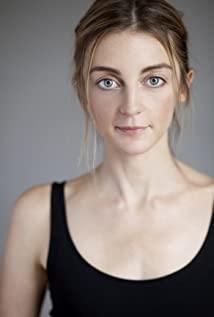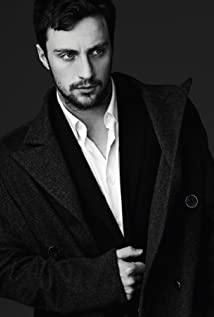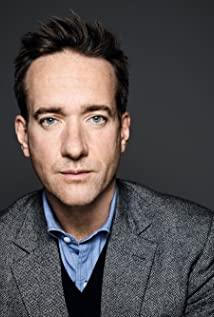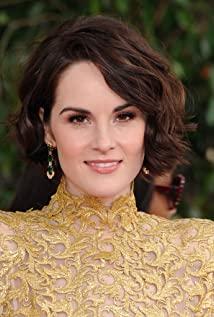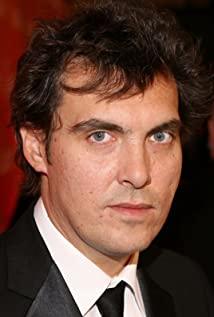When the fresh and determined enterprising spirit and the conservative and outdated concept of the old age are so harmoniously combined, we are fortunate to see this version of "Anna Karenina" without accident and mixed praise. This is a powerful challenge of modern spirit to traditional narrative, and it is also a magnificent concept transplantation in the cultural sense. What makes this feast even more exciting is that sitting behind it is the undisputed list of the greatest writers. Tolstoy.
In a sense, Joe White may not want to see that his work will be preserved for later generations as a test product, as a classic commentary case rather than a classic adaptation, but at least everyone will remember this. This is not mediocre "Anna Karenina", because it is difficult to see in a single work how the adaptor carefully pushes the boundaries of innovation, and then resolutely hides in conservative limits.
British stage type transplant
afraid any Russians, the Soviet Union and even cooked watching movies Chinese audience will be keen feel a little weird, bizarre and unrelated to this stage sense, but simply some kind of pretense atmosphere and screen; the more strange form The romantic atmosphere of sense and light comedy reflects the British Empire’s subjective fantasy about the Russian Empire, and this fantasy is completely from beginning to end, with the consistent condensedness of British literary works, point-to-point and subtle. .
From this perspective, I know that many of the details of the original works cannot be discarded, such as the paper knife that Anna plays while reading on the train, the little box that Karenin always plays with and the creaking knuckles, Anna and Warren at the ball. Skye's dim eyes changed. Because these are the places that the British people value most, as well as the exquisiteness and lightness beyond this.
The most impressive part of the whole movie is undoubtedly the stage-style shooting technique. Let the narrative method and form structure of a work become the core of the whole work, Joe White at least stood at the forefront of the adaptation of literary classics and movies. Some people ridicule this method of shooting to save money, but in all fairness, this method of shooting solves one of the most classic problems in film shooting: the transition rhythm. Under the setting of the stage play, St. Petersburg and Moscow, the vast Russian plains and snowfields, are just right to be moved by switching with combinations. All the scenes are no longer scattered focal points, but are hand-picked in one work. Standing elements, this kind of space freedom that only novels and stages could give audiences and creators in the past is finally realized in movies. Of course, it is worth mentioning that Anna’s suicide was the last one; in the past, from her falling into anxiety and psychedelic movement to the train station, the contradiction between the fast psychological rhythm and the slow time-space gap has always been a difficult problem for shooting. After creating the psychedelic feeling of morphine with the empty lens and the gradual illusion lens, the light gauze is lifted up like a curtain, and the scene inside the train is naturally ready to emerge. The lens immediately cuts into Anna’s close-up, and the suicide bridge quickly unfolds. The fluency of narrative is by no means comparable to ordinary film and television adaptations in the past.
Many people can't accept the form of stage play, which may vary from person to person. As an audience who loves stage art, when the transition of "Anna Karenina"'s stage play follows the exquisite long shots, it is completely hot and enthusiastic about stage art and film art. A perfect intercourse is enough to make a climax from the perspective of form alone. What is surprising is of course the ingenious sense of seeing countless imagined scenes in my mind, symbolized and moved to the stage; when the office quickly changes into a London hotel, when the racetrack and the theater are suddenly seamlessly connected, when the opera The box suddenly became a circular theater, Sergei’s bedroom and gallery-like layout, Karenin sat on an unmanned stage when he was alone, not to mention that Anna and Volensky’s dance was halfway through, everyone around him Suddenly fixed the shape, and then chased the light to the stage where only the two of them were left.
I think the audience must be able to hear Joe White's sneer behind the camera at this time; it is a kind of gimmicky and almost dazzling pride, combined with various art forms to achieve a rare unified field of complacency; however; The more he laughs, the more novel the form, the more unfamiliar his performance, and the more bold the exaggeration, in fact, what the audience can understand is the director's timidity and difficulty in facing the original work: such transplantation is not so much a transplant. Adaptation is better than starting anew.
British-style performance.
This version of "Anna Karenina" attracted countless drools at the beginning of filming. The reason for being pulled to the forefront is naturally not how we mentioned how to transplant British style in Russian masterpieces, or how to adopt it. These literary and artistic critical issues of the stage play form are undoubtedly the casting. "Keira Knightley’s chest, Jude Law’s hair", these two major complaints have been eternal controversies since the beginning of the filming; this is also the permanent destiny of the adaptation of the literary masterpiece film: every character is in Different readers have very different lives, and it is obviously impossible to please everyone.
But despite this, for Keira Knightley as Anna Karenina, we can only say that this is a helpless and regrettable choice. Looking at the entire Hollywood, looking at the entire movie history, playing Anna Karenina is not only of its own meaning, but more importantly, it is a proof and declaration of the actress's status. Take a look at the names of actresses who have played this role in the past: Greta Garbo, Vivien Leigh, Tatiana Samoylova, Sophie Marceau, you may only be able to come up with these names. Conclusion: A character like Anna Karenina can't be used by non-goddess.
So, when Joe White chose to adapt "Anna Karenina", he chose Keira Knightley almost inevitable and without choice; for himself, he chose his beloved and the cooperation was the most tacit. For Keira Knightley, this is the reward for her persistence in shooting literary films for so many years, and it is also the ladder for her promotion from ordinary stars to goddess-level figures; for producers and investors Said that this is also the most likely choice for commercial returns and awards. Then, as a result, the audience and Tolstoy himself will naturally be ignored-no matter how fierce you are, Keira Knightley's overly British facial features, Xiaojiabiyu's unobtrusive temperament, can't bear to look directly at the dynamics when laughing. She has the airfield-like figure of Heathrow, she is the most suitable for the film creators.
This is a kind of sadness for "Anna Karenina", because of the immortal status of this work, the choice of this role can never be pure. So if you put this point aside, Keira Knightley’s performance is actually enough to be nominated for an Oscar queen—if she is based on her Elizabethan in "Pride and Prejudice" as the nomination criteria. She has worked hard enough to challenge herself: before the train entered the station, she suddenly shifted from a state of sorrow and indifference, the bravery of self-destruction, the burning of vitality, and the ecstasy of death, at least in a moment of shocking smile. At that moment, she was undoubtedly Anna who committed suicide on the rails.
But in fact, if you look at it from this perspective, Aaron Johnson’s Volensky is also good enough. He does not have the depth of performance, but perhaps he does not need depth; although he is still a white face from beginning to end, he is not mature. The charm of male hormones, but at least the intuitive stimulation of Prince Charming, the graceful volatility of playboy, and the youthful feeling of finally resolutely deciding to take responsibility are already in place. And Jude Law is already invaluable. No one would have thought that he would play Karenin, and under such a handsome appearance, he could show the tolerance of the British standard, a calm expression, and a calm emotional tearing. Once we thought that Jude Law was the perfect candidate for Wolensky. However, he used a vicissitudes of life Karenin to explain to us the essence of the actor; perhaps one day, Aaron Johnson will be like him, washed out and reborn.
British middle-class prudence
Tolstoy originally wanted to create a story about Levin, telling Levin's thought change, hard exploration, and finally found a new way of self-liberation and salvation. Levin is himself, so much so that he has been searching for relief like Levin all his life. In his Levin story, Anna Karenina was originally just a small episode—a fallen woman, prompting Levin to think about the meaning of family. However, it was written that the evil power of art began to drive Tolstoy out of moral narrowness, prompting him to use a flowery pen to shape the most amazing woman of the era: this woman and her love travel through any era. The shackles of traverse the political and sociological categories, directly piercing people's hearts. The power of love, the primitive desire of mankind, and people instinctively attract each other, women are facing social choices, the value and cost of freedom.
This is what makes me most disappointed in this film, and this disappointment is precisely a kind of literary criticism disappointment, purely a conflict of views and a contradiction of value. Because the reason why we don't need to transplant the British style into the Russian story is not just because of the different appearance and atmosphere, but more because of the different national psychology and national temperament. Although I love the British style, the battle of passion and reason, the deep but forbearing emotion, but I don’t need any work to be like this, "Anna Karenina" is "Anna Karenina". Lenina, it doesn’t have to become another Jane Austen or Wuthering Heights, it is itself.
Although this movie retains Levin's part, the trivial and boring story makes it impossible to remember him; what the ordinary audience remembers is still the core of the story-this woman and her cheating. There are only two results: Either the heroine is portrayed as a sympathetic character who sacrifices for love and moths fighting the fire, or he is portrayed as a slut who evades responsibility and is selfish and selfish and cannot live. I believe that the value of the original "Anna Karenina" lies in shaping Anna into the former; and I believe that the failure of this adaptation lies in shaping Anna into the latter.
This has nothing to do with the actors. Of course, you would say that Keira Knightley’s dusty air caused a certain impact, but in the end Karenin became a saintly existence, and Wolensky and Anna became damned, self-sufficient. The perception of the adulterer and the adulterer is definitely related to the emotional choice and value orientation of the creators. They may say that this is innocent. They are loyal to the original and represent the bridge of the original, but this is like language, like ideology, and the attitude behind it determines everything.
Of course, I am not saying that I support Anna Karenina, who was under the interpretation of proletarian literary concepts decades ago. There is no need to demonize Karenin as a cold representative of the feudal class, and to portray Anna’s family as a darkness that oppresses women. Hell, beautify the love between Anna and Volensky as rebelling against the old forces to pursue human freedom, but there is no doubt that the creators headed by Joe White are overcorrecting: their perspective and judgment are completely different from those of the ladies who despise Anna. Difference: They are from the standpoint of the nobility or the middle class, and look at this derailment with a kind of illusory compassion and self-moral satisfaction of looking at extraterrestrial creatures or the lower class of society, and then use this kind of "goodness". The ending of "retribution for good and evil for evil" emphasizes the family value that has long been said to be rotten, and then conservative and contented expectation that the whole world will continue to remain unchanged.
When Karenin was playing happily with his two children in a beautiful grassland at the end, he carried the brilliance of a saint on his body. The family, children and affection drowned Anna's charm at that moment, and the whole play was wild. Under the novel and formal avant-garde dance, Tolstoy is described as a mediocre bedtime story whose purpose is to teach children to be obedient.
View more about Anna Karenina reviews


